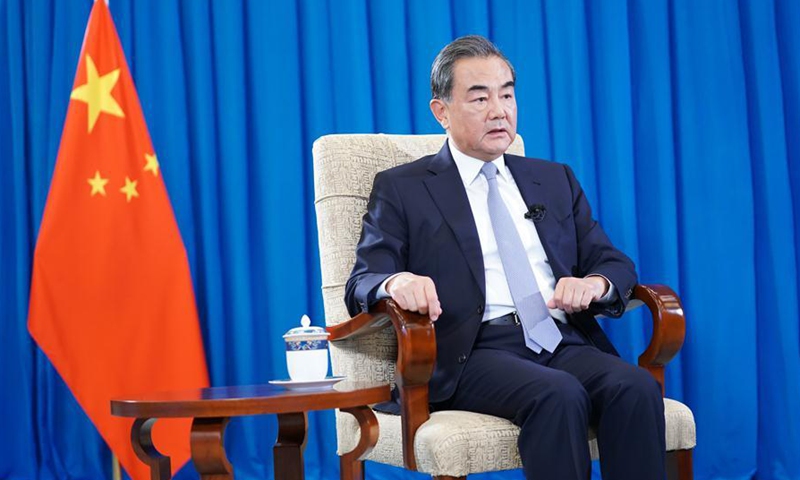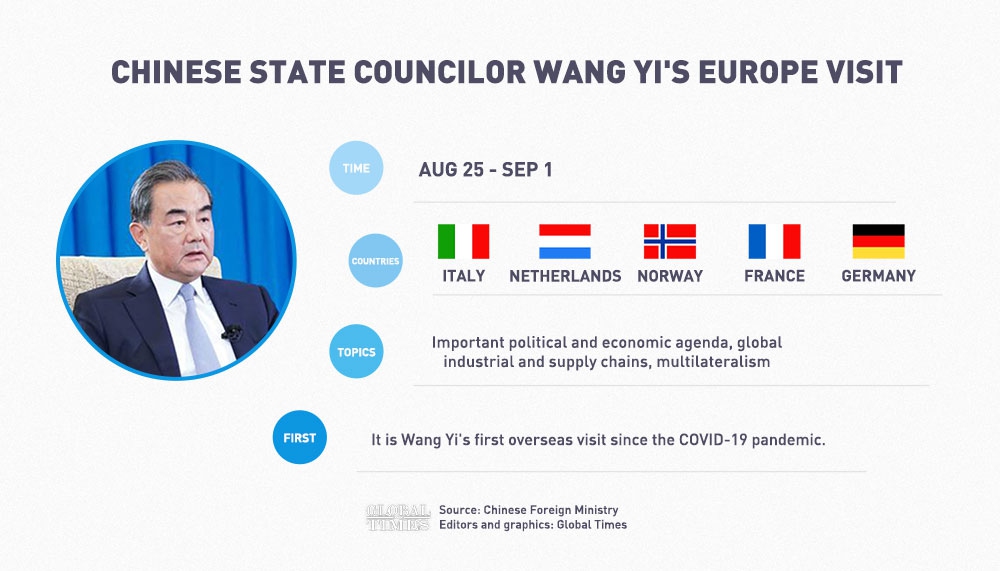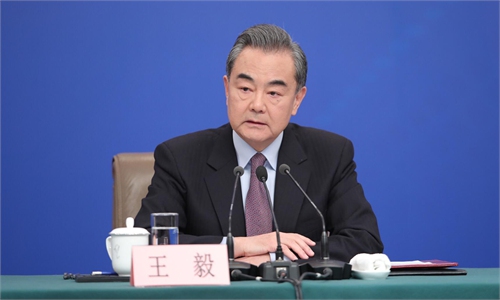Wang Yi's Europe visit to call for multilateralism, strengthen cooperation amid US' unilateralism
China, Europe to facilitate more offline exchanges, accelerate investment agreement negotiations

Chinese State Councilor and Foreign Minister Wang Yi. (Xinhua/Zhai Jianlan)
Chinese State Councilor Wang Yi's upcoming Europe visit will help consolidate China-Europe relations, explore practical cooperation in responding to the pandemic and call for multilateralism amid US unilateralism and attempts to form an anti-China alliance in Europe, analysts said.
Wang, who is also the Foreign Minister, will visit Italy, the Netherlands, Norway, France and Germany in his first overseas visit since the COVID-19 pandemic. The week-long visit has been welcomed by the relevant countries and demonstrates that both sides attach great importance to China-Europe relations, said Zhao Lijian, spokesperson of the Chinese Foreign Ministry, on Monday.
There are three objectives through the visit amid the 45th anniversary of diplomatic relations between China and the EU: advancing the important political and economic agenda of the two sides, stabilizing the global industrial and supply chains in response to the COVID-19 pandemic and further exploring cooperation in emerging areas such as the digital economy and green economy, and calling for multilateralism to be upheld and global governance to be improved to make a greater contribution to world peace, stability and development, Zhao said.
Wang's Europe trip will consolidate the relations between China and Europe and voice support for multilateralism amid US unilateralism, trade protectionism and repeated attempts to build a European alliance against China, Cui Hongjian, director of the Department of European Studies at the China Institute of International Studies, told the Global Times on Monday.
The visit covers major European countries from different areas in South, West and North Europe.
Wang's visit signals that normal exchanges and communications between China and Europe are gradually being resumed after being interrupted by the COVID-19 pandemic, and high-level exchanges such as the previously scheduled September China-EU summit may be put on the agenda.
At the same time, the visit could set up conditions and timeline to allow more offline meetings, exchanges and normal business activities to gradually resume, Cui said.
Multilateralism is one of the most frequently mentioned words in political documents between China and Europe, and it is crucial at this time as the US keeps trampling on multilateral trade rules and brandishes the stick of unilateral sanctions, analysts said.
The US' trade protectionism has greatly undermined its international leadership, and both China and Europe need an open, rules-based global economic system, He Zhigao, a research fellow with the Institute of European Studies at the Chinese Academy of Social Sciences, told the Global Times.
Against this backdrop, China and Europe will lead a new round of globalization through multilateral cooperation to offer more global public goods and benefit people around the world, He said.
Wang Yiwei, a professor at the School of International Relations of Renmin University of China, told the Global Times that moves by China and Europe to highlight multilateralism also paved the way for the ongoing WTO reform and the UN General Assembly in September.
The visit came after US Secretary of State Mike Pompeo made two Europe tours in one month aimed at bringing these countries on board to confront China and Russia.
Europe has increasingly realized that playing with the US in its political games will hurt its own interests, as the US could woo Europe with "democracy" one day and impose sanctions on European ports the next, Cui said.
China and Europe have upheld multilateralism in issues such as climate change and recent Iran nuclear issue, with both sides opposing US' long-arm jurisdiction and withdrawal from international organizations.
On the US attempt to reimpose sanctions on Iran, foreign ministers of the UK, France and Germany said in a joint letter that the US does not have standing to trigger "snapback" sanctions as it "ceased to be a participant" of the Iran nuclear deal in 2018.
China will continue to encourage Europe to maintain strategic independence in accordance with its own fundamental and long-term interests and strengthen practical cooperation with Europe, analysts said.
Wang's visit is likely to accelerate negotiations on the China-EU investment agreement and cooperation in tackling climate change and other fields, Cui said.
He said that some EU negotiators complained about a lack of Chinese commitment in the negotiations, but they should know that the frictions are due to the fact that China was sincere and serious about the agreement.
The China-Europe freight train service has demonstrated its safety and efficiency, expanded services and added new routes, while global shipping has been disrupted by the COVID-19 pandemic.

During the first six months of the year, the number of freight trips between China and Europe rose 36 percent year-on-year to 5,122, with the figure hitting a record high of 1,169 in June, and cargo shipments increased 41 percent to 461,000 TEUs. It has been a good example for countries seeking to resume work and production and revive the economy, according to the Chinese Foreign Ministry.
According to the website of the Italian Ministry of Foreign Affairs and International Cooperation, Minister of Foreign Affairs and International Cooperation Luigi Di Maio will meet Wang at Villa Madama on Tuesday, and the two ministers will hold a joint press conference after the meeting.
Choosing Italy as the first stop will lay a solid foundation and make for a good atmosphere for the following stops, Cui said.
The cooperation between China and Italy before and during the COVID-19 pandemic has set up an outstanding model of cooperation between China and other European countries, as Italy and China signed a memorandum of understanding on the Belt and Road Initiative in 2019 and China sent medical experts and helped Italy fight against the COVID-19 pandemic, Cui said.
Although Telecom Italia recently excluded Chinese Technology giant Huawei from supplying 5G services, it was a commercial decision that did not politicize the issue. This was in contrast to the UK and the US, where the exclusion of Huawei was regarded as a political decision linking Huawei with security concerns, Cui said.


